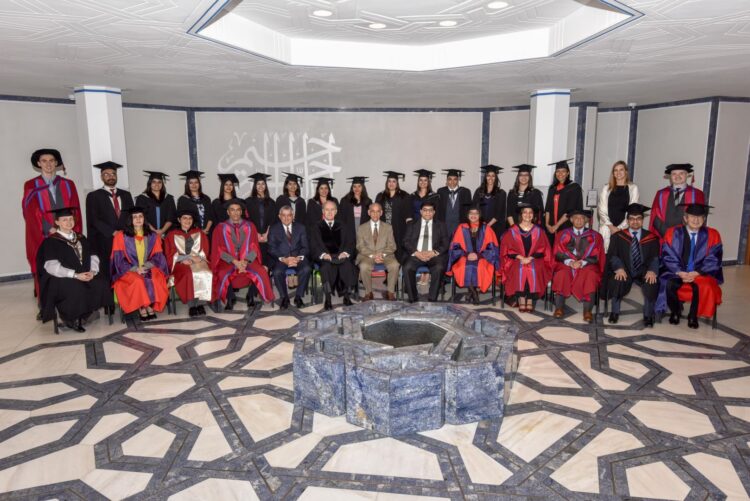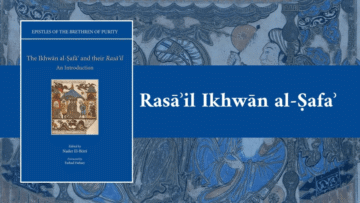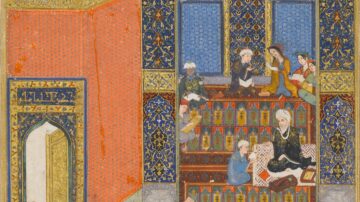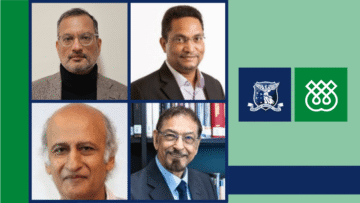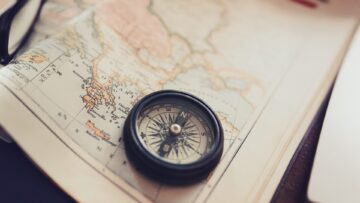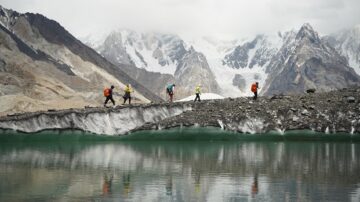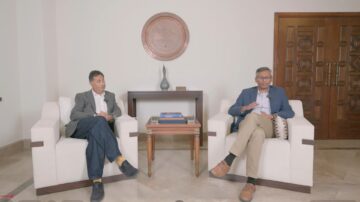In this graduation ceremony, coinciding with IIS’ 25th anniversary, Prince Rahim Aga Khan shares his hopes for the graduates in their future work. IIS graduate programmes prepare students to be future thought leaders on the diversity of thought within Islam and in interactions with other global communities.
Bismillah ir-Rahman-ir-Rahim
Distinguished guests; governors, faculty, staff and students of The Institute of Ismaili Studies, families and very young children of the graduates; ladies and gentlemen, I am thrilled to join the graduation ceremony in honour of those completing the IIS Graduate Programme in Islamic Studies and Humanities. To you, to your families and to all those who have helped you in this achievement, I say mash’Allah. You have my warmest congratulations not only for the work you have done, and the goals you have accomplished, but also for the choice you made when you decided to pursue, at an advanced level, the systematic study of our traditions, cultures, and history.
I am sure that you are genuinely proud of your achievements, as you should be. But even as you look back with great pride, I am also sure that you are looking ahead with great hopes. As you do, it is my own hope that the education that you have gained through this programme will lead to great success in your chosen fields of endeavour, whatever those may be.
This being said, and in view of your achievement, I am convinced that the institutions of the Imamat and of the Jamat could benefit directly from the contribution of each of you, either in a professional or a voluntary capacity. Such a contribution would certainly be in keeping with the ethic of our faith that makes it incumbent upon each of us to use our blessings – be they material or intellectual – to assist our families, to serve the Jamat and the Ummah, and to help improve society, and indeed, all of humanity. The Jamat and its institutions need young and dynamic women and men like you, who are able to draw on the rich heritage of our past, and on the best educations of the present, to address the challenges of the future.
As I believe you all know, the Aga Khan Development Network is engaged in an ever-wider set of activities across the Muslim world, and beyond. The work ranges from health and education to media and infrastructure, from finance to manufacturing, from culture to tourism. These efforts are focussed on improving the quality of lives of peoples in myriad regions, from varying backgrounds, and of different faiths. Our model, however, even when it involves the world beyond Islam, and even when it extends beyond the present decade, is also deeply rooted in Muslim values. Among other things, our approach to development is holistic and conceived organically, meaning that our action is shaped with the full involvement of the potential beneficiaries, rather than prescribed or imposed from without. Only in this way, we believe, can our work be self-sustaining.
The implication of this approach, of course, is that the AKDNThe Aga Khan Development Network (AKDN) is a contemporary endeavour of the Ismaili Imamat to realise the ethics and social conscience of Islam through institutional action. More needs a particularly sound and deep understanding of the environments in which it operates – their cultures, their norms, their traditions and their faiths: precisely the areas of scholarship that you have pursued. The AKDN also needs fresh minds, endowed with cutting-edge knowledge of crucial sectors, in order to remain effective.
Education, international studies and diplomacy, non-profit leadership, media, development, law, and regional studies will all be among the most relevant fields of expertise in the decades ahead. This will be particularly true in the developing world. In deciding to attend the IIS, you therefore also chose to analyse and understand the problems of the developing world, and to address some of the most intractable issues of our time.
I hope that as you look to life beyond the IIS programme, some of you will consider careers with the global network of Imamat institutions, for these organisations are also trying to understand and address the same challenges.
I was impressed to learn that amongst you are represented five different nationalities, as are several diverse cultural traditions of our JamatAssembly or religious congregation; also a term used by the Nizari Ismailis for their individual communities.. I am certain that this diversity has enhanced your classroom experience, and I am confident that it will have given you a deeper appreciation of the meaning and value of diversity itself.
We are all aware that we live in a world where diversity is often evoked as a threat and, more particularly, where diversity in the interpretation of a faith can be seen as a sign of disloyalty. This phenomenon is sometimes perceived to apply principally to Muslims, but it also exists in other societies. Absolutist, exclusivist, and rejectionist claims to the truth, especially to religious truth, are increasingly heard from all quarters. Rather than seeing religion as a humble process of growth in faith, some people presume to claim that they have arrived at the end of that journey and can therefore speak with near-divine authority.
Unfortunately, in some parts of the Muslim world today, hostility to diverse interpretations of Islam, and lack of religious tolerance, have become chronic, and worsening, problems. Sometimes these attitudes have led to hatred and violence. At the root of the problem is an artificial notion amongst some Muslims, and other people, that there is, or could ever be, a restricted, monolithic reality called Islam.
Our Ismaili tradition, however, has always accepted the spirit of pluralism among schools of interpretation of the faith, and seen this not as a negative value, but as a true reflection of divine plenitude. Indeed, pluralism is seen as essential to the very survival of humanity. Through your studies you have known the many Qur’anic verses and hadiths of our beloved Prophet Muhammad (peace be upon him) that acknowledge and extol the value of diversity within human societies. You all know, I am sure, the hadith to the effect that differences of interpretation between Muslim traditions should be seen as a sign of the mercy of Allah.
It should also be clear to anyone who has studied Islamic history or literature, that Islam is, and has always been, a quest that has taken many forms. It has manifested itself in many ways – in different times, amongst different peoples, with changing and evolving emphases, responding to changing human needs, preoccupations, and aspirations.
Even during the early centuries of Islam, there was diversity of intellectual approaches among Muslims. Today, however – both outside the Islamic world and inside it – many people have lost sight of, or wish to be blind to, Islam’s diversity, and to its historical evolution in time and place along a multitude of paths. It befalls us, then, to help those outside the Muslim World to understand Islamic diversity, even as we provide an intellectual counterpoint to those within Islam who would reject it.
I hope that you, as graduates of this programme, will include this message in your own ways in the years ahead, through your work and your words, by your attitudes, by your actions, and by example.
The untrue and unfair, but increasingly widespread equating of the words “Islam” and “Muslim” with “intolerance”, sometimes even with the word “terrorism”, could lead some Muslims to feel despair, indignation, or even shame. To me, however, the current global focus on the Muslim world, and on Islam itself, presents a golden opportunity for us to educate and enlighten, while actively exemplifying the counterpoint I mentioned before. To my eyes, it creates an opportunity, and an even-greater obligation for us to make a positive and visible impact on the world – on culture and art, science and philosophy, politics and ecology, among others.
In order to respond to this opportunity, it will be crucial to reverse another damaging consequence of intolerance, which has been the dissuasion of many Muslim populations from seeking access to what has been called the Knowledge Society. Without an acceptance of diversity, without the ability to harness the creativity that stems from pluralism, the very spirit of the Knowledge Society is stifled. We must encourage, I believe, that Muslims of all communities come together, working collaboratively to tap into the vast endowment of knowledge available today, and without which progress is, if not halted, at least deferred. This cannot be done in the absence of open-mindedness or tolerance.
Implicit in this approach is the need for humility, which is also a central Muslim value. We must all search for the answers to the challenges of our generation, within the ethical framework of our faith, and without pre-judging one another or arbitrarily limiting the scope of that search. Like the great Muslim artists, philosophers and scientists of centuries past, we must enthusiastically pursue knowledge on every hand, always ready to embrace a better understanding of Allah’s creation, and always ready to harness this knowledge in improving the quality of life of all peoples.
As you look towards the future, I hope that you will remember that intellectual pursuits should, wherever possible, seek to address the universal aspirations of humankind, both spiritual and concrete. Those aspirations, for our generation more than for any before, are intertwined in a single global community.
It can be overwhelming at times to ponder the vast array of new problems which seem to multiply in this globalised world.
These include the implications of new technologies and new scientific insights, raising new ethical and legal questions. They include delicate and complex ecological issues, such as the great challenge of climate change. They include matters ranging from the widening gap between rich and poor, to issues of proper governance and effective, fair, and representative government, and to the spread of rampant consumerism and greed, at the expense of others, or of our environment. In some communities, illiteracy and innumeracy are not only continuing problems but are even growing problems. And our challenges also include the increasing difficulty of nurturing pluralism in the face of strong normative trends – finding ways to accommodate our differences – even as hugely differing peoples find themselves in much closer contact with one another.
You have been engaged in studies, some of which analysed the achievements of past Muslim civilisations. What I hope you have come to see is that understanding past Muslim achievements, traditions, values, and ethics should also have equipped you exceptionally well to address the great emerging issues of our own times.
As you now graduate into this challenging world, you will be taking with you the hopes of those who founded, and of those who now drive this study programme. Their central hope is that you will become global leaders in a variety of fields, bearing with you as you go, and applying always, the open-mindedness of our tradition, and the ethics of our faith.

